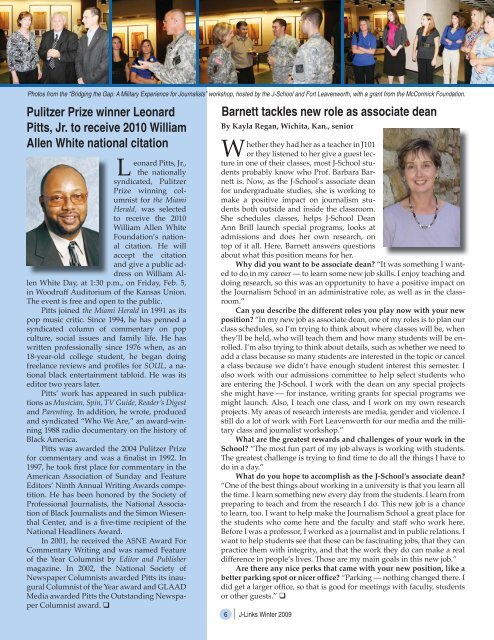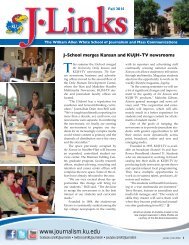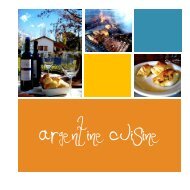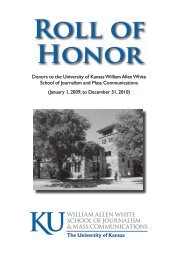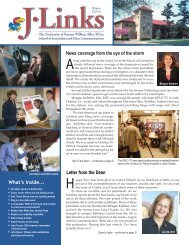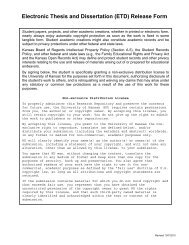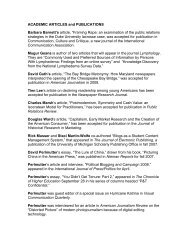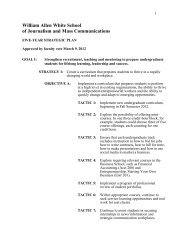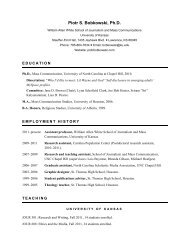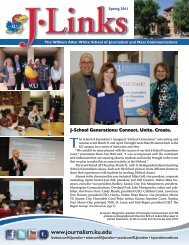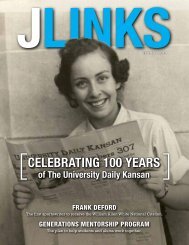alumni news & notes - School of Journalism and Mass ...
alumni news & notes - School of Journalism and Mass ...
alumni news & notes - School of Journalism and Mass ...
You also want an ePaper? Increase the reach of your titles
YUMPU automatically turns print PDFs into web optimized ePapers that Google loves.
Photos from the “Bridging the Gap: A Military Experience for Journalists” workshop, hosted by the J-<strong>School</strong> <strong>and</strong> Fort Leavenworth, with a grant from the McCormick Foundation.<br />
Pulitzer Prize winner Leonard<br />
Pitts, Jr. to receive 2010 William<br />
Allen White national citation<br />
L<br />
eonard Pitts, Jr.,<br />
the nationally<br />
syndicated, Pulitzer<br />
Prize winning columnist<br />
for the Miami<br />
Herald, was selected<br />
to receive the 2010<br />
William Allen White<br />
Foundation’s national<br />
citation. He will<br />
accept the citation<br />
<strong>and</strong> give a public address<br />
on William Allen<br />
White Day, at 1:30 p.m., on Friday, Feb. 5,<br />
in Woodruff Auditorium <strong>of</strong> the Kansas Union.<br />
The event is free <strong>and</strong> open to the public.<br />
Pitts joined the Miami Herald in 1991 as its<br />
pop music critic. Since 1994, he has penned a<br />
syndicated column <strong>of</strong> commentary on pop<br />
culture, social issues <strong>and</strong> family life. He has<br />
written pr<strong>of</strong>essionally since 1976 when, as an<br />
18-year-old college student, he began doing<br />
freelance reviews <strong>and</strong> pr<strong>of</strong>iles for SOUL, a national<br />
black entertainment tabloid. He was its<br />
editor two years later.<br />
Pitts’ work has appeared in such publications<br />
as Musician, Spin, TV Guide, Reader’s Digest<br />
<strong>and</strong> Parenting. In addition, he wrote, produced<br />
<strong>and</strong> syndicated “Who We Are,” an award-winning<br />
1988 radio documentary on the history <strong>of</strong><br />
Black America.<br />
Pitts was awarded the 2004 Pulitzer Prize<br />
for commentary <strong>and</strong> was a finalist in 1992. In<br />
1997, he took first place for commentary in the<br />
American Association <strong>of</strong> Sunday <strong>and</strong> Feature<br />
Editors’ Ninth Annual Writing Awards competition.<br />
He has been honored by the Society <strong>of</strong><br />
Pr<strong>of</strong>essional Journalists, the National Association<br />
<strong>of</strong> Black Journalists <strong>and</strong> the Simon Wiesenthal<br />
Center, <strong>and</strong> is a five-time recipient <strong>of</strong> the<br />
National Headliners Award.<br />
In 2001, he received the ASNE Award For<br />
Commentary Writing <strong>and</strong> was named Feature<br />
<strong>of</strong> the Year Columnist by Editor <strong>and</strong> Publisher<br />
magazine. In 2002, the National Society <strong>of</strong><br />
Newspaper Columnists awarded Pitts its inaugural<br />
Columnist <strong>of</strong> the Year award <strong>and</strong> GLAAD<br />
Media awarded Pitts the Outst<strong>and</strong>ing Newspaper<br />
Columnist award. <br />
Barnett tackles new role as associate dean<br />
By Kayla Regan, Wichita, Kan., senior<br />
W<br />
hether they had her as a teacher in J101<br />
or they listened to her give a guest lecture<br />
in one <strong>of</strong> their classes, most J-<strong>School</strong> students<br />
probably know who Pr<strong>of</strong>. Barbara Barnett<br />
is. Now, as the J-<strong>School</strong>’s associate dean<br />
for undergraduate studies, she is working to<br />
make a positive impact on journalism students<br />
both outside <strong>and</strong> inside the classroom.<br />
She schedules classes, helps J-<strong>School</strong> Dean<br />
Ann Brill launch special programs, looks at<br />
admissions <strong>and</strong> does her own research, on<br />
top <strong>of</strong> it all. Here, Barnett answers questions<br />
about what this position means for her.<br />
Why did you want to be associate dean? “It was something I wanted<br />
to do in my career — to learn some new job skills. I enjoy teaching <strong>and</strong><br />
doing research, so this was an opportunity to have a positive impact on<br />
the <strong>Journalism</strong> <strong>School</strong> in an administrative role, as well as in the classroom.”<br />
Can you describe the different roles you play now with your new<br />
position? “In my new job as associate dean, one <strong>of</strong> my roles is to plan our<br />
class schedules, so I’m trying to think about where classes will be, when<br />
they’ll be held, who will teach them <strong>and</strong> how many students will be enrolled.<br />
I’m also trying to think about details, such as whether we need to<br />
add a class because so many students are interested in the topic or cancel<br />
a class because we didn’t have enough student interest this semester. I<br />
also work with our admissions committee to help select students who<br />
are entering the J-<strong>School</strong>. I work with the dean on any special projects<br />
she might have — for instance, writing grants for special programs we<br />
might launch. Also, I teach one class, <strong>and</strong> I work on my own research<br />
projects. My areas <strong>of</strong> research interests are media, gender <strong>and</strong> violence. I<br />
still do a lot <strong>of</strong> work with Fort Leavenworth for our media <strong>and</strong> the military<br />
class <strong>and</strong> journalist workshop.”<br />
What are the greatest rewards <strong>and</strong> challenges <strong>of</strong> your work in the<br />
<strong>School</strong>? “The most fun part <strong>of</strong> my job always is working with students.<br />
The greatest challenge is trying to find time to do all the things I have to<br />
do in a day.”<br />
What do you hope to accomplish as the J-<strong>School</strong>’s associate dean?<br />
“One <strong>of</strong> the best things about working in a university is that you learn all<br />
the time. I learn something new every day from the students. I learn from<br />
preparing to teach <strong>and</strong> from the research I do. This new job is a chance<br />
to learn, too. I want to help make the <strong>Journalism</strong> <strong>School</strong> a great place for<br />
the students who come here <strong>and</strong> the faculty <strong>and</strong> staff who work here.<br />
Before I was a pr<strong>of</strong>essor, I worked as a journalist <strong>and</strong> in public relations. I<br />
want to help students see that these can be fascinating jobs, that they can<br />
practice them with integrity, <strong>and</strong> that the work they do can make a real<br />
difference in people’s lives. Those are my main goals in this new job.”<br />
Are there any nice perks that came with your new position, like a<br />
better parking spot or nicer <strong>of</strong>fice? “Parking — nothing changed there. I<br />
did get a larger <strong>of</strong>fice, so that is good for meetings with faculty, students<br />
or other guests.” <br />
6 J-Links Winter 2009


